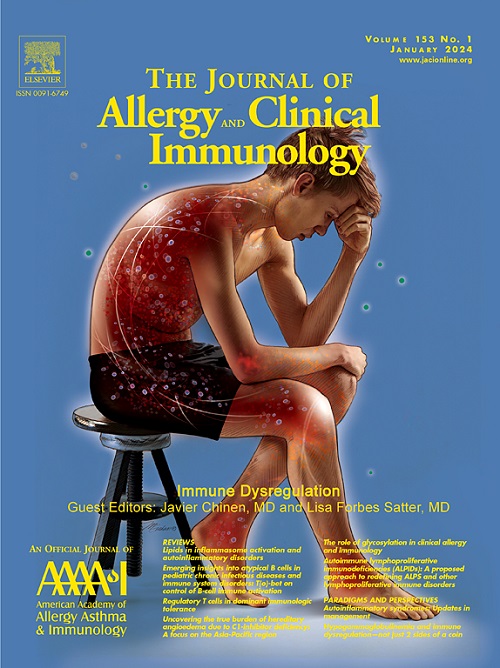使用大型语言模型对临床症状进行聚类,发现肥大细胞活化综合征共识标准的拟议替代标准诊断特异性较低。
IF 11.4
1区 医学
Q1 ALLERGY
引用次数: 0
摘要
背景:自肥大细胞活化综合征(MCAS)最初被描述为肥大细胞增多症样表型以来,其诊断率不断上升。虽然一套联合的肥大细胞活化综合征诊断标准已被很好地描述并广为接受,但这一比率的增加是在提出了一套更广泛的肥大细胞活化综合征替代标准的背景下发生的:有效的诊断标准必须尽量减少可能被错误归类为相关疾病的不相关诊断的范围。我们试图确定与 MCAS 替代标准相关的症状是否会导致诊断替代方案不够简洁或不一致,从而降低诊断特异性:方法:我们使用了多种大型语言模型,包括 ChatGPT、Claude 和 Gemini,以引导符合联合或替代 MCAS 标准的诊断概率。与对照诊断标准(包括系统性红斑狼疮(SLE)、川崎病和偏头痛)相比,我们利用多样性和网络分析来量化诊断的精确性和特异性:结果:与MCAS联盟标准相比,MCAS替代标准的诊断变异性更大(香农多样性分别为5.8和4.6;P值=0.004),精确性更低(平均布雷-柯蒂斯相似度分别为0.07和0.19;P值=0.004)。与两种不同的系统性红斑狼疮标准得出的诊断网络的相似性相比(余弦相似性分别为0.55 vs. 0.86;p值=0.0022),联合标准和替代MCAS标准得出的诊断网络的网络间相似性较低:结论:与MCAS联盟标准相比,MCAS替代标准与一组不同的诊断相关,而且诊断一致性较低。这种缺乏特异性的情况在多重对照标准中尤为明显,令人担忧替代标准会过度导致 MCAS 诊断过度,从而将更合适的诊断排除在外。本文章由计算机程序翻译,如有差异,请以英文原文为准。
Clustering of clinical symptoms using large language models reveals low diagnostic specificity of proposed alternatives to consensus mast cell activation syndrome criteria
Background
The rate of diagnosis of mast cell activation syndrome (MCAS) has increased since the disorder’s original description as a mastocytosis-like phenotype. While a set of consortium MCAS criteria is well described and widely accepted, this increase occurs in the setting of a broader set of proposed alternative MCAS criteria.
Objective
Effective diagnostic criteria must minimize the range of unrelated diagnoses that can be erroneously classified as the condition of interest. We sought to determine if the symptoms associated with alternative MCAS criteria result in less concise or consistent diagnostic alternatives, reducing diagnostic specificity.
Methods
We used multiple large language models, including ChatGPT, Claude, and Gemini, to bootstrap the probabilities of diagnoses that are compatible with consortium or alternative MCAS criteria. We utilized diversity and network analyses to quantify diagnostic precision and specificity compared to control diagnostic criteria including systemic lupus erythematosus, Kawasaki disease, and migraines.
Results
Compared to consortium MCAS criteria, alternative MCAS criteria are associated with more variable (Shannon diversity 5.8 vs 4.6, respectively; P = .004) and less precise (mean Bray-Curtis similarity 0.07 vs 0.19, respectively; P = .004) diagnoses. The diagnosis networks derived from consortium and alternative MCAS criteria had lower between-network similarity compared to the similarity between diagnosis networks derived from 2 distinct systemic lupus erythematosus criteria (cosine similarity 0.55 vs 0.86, respectively; P = .0022).
Conclusion
Alternative MCAS criteria are associated with a distinct set of diagnoses compared to consortium MCAS criteria and have lower diagnostic consistency. This lack of specificity is pronounced in relation to multiple control criteria, raising the concern that alternative criteria could disproportionately contribute to MCAS overdiagnosis, to the exclusion of more appropriate diagnoses.
求助全文
通过发布文献求助,成功后即可免费获取论文全文。
去求助
来源期刊
CiteScore
25.90
自引率
7.70%
发文量
1302
审稿时长
38 days
期刊介绍:
The Journal of Allergy and Clinical Immunology is a prestigious publication that features groundbreaking research in the fields of Allergy, Asthma, and Immunology. This influential journal publishes high-impact research papers that explore various topics, including asthma, food allergy, allergic rhinitis, atopic dermatitis, primary immune deficiencies, occupational and environmental allergy, and other allergic and immunologic diseases. The articles not only report on clinical trials and mechanistic studies but also provide insights into novel therapies, underlying mechanisms, and important discoveries that contribute to our understanding of these diseases. By sharing this valuable information, the journal aims to enhance the diagnosis and management of patients in the future.

 求助内容:
求助内容: 应助结果提醒方式:
应助结果提醒方式:


